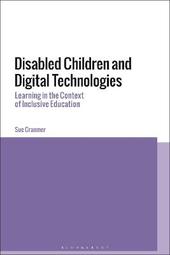
|
Disabled Children and Digital Technologies: Learning in the Context of Inclusive Education
Hardback
Main Details
| Title |
Disabled Children and Digital Technologies: Learning in the Context of Inclusive Education
|
| Authors and Contributors |
By (author) Dr Sue Cranmer
|
| Physical Properties |
| Format:Hardback | | Pages:192 | | Dimensions(mm): Height 234,Width 156 |
|
| ISBN/Barcode |
9781350002050
|
| Classifications | Dewey:004.087 |
|---|
| Audience | | Professional & Vocational | |
|---|
| Illustrations |
10 bw illus
|
|
Publishing Details |
| Publisher |
Bloomsbury Publishing PLC
|
| Imprint |
Bloomsbury Academic
|
| Publication Date |
26 November 2020 |
| Publication Country |
United Kingdom
|
Description
There is much evidence to show that digital technologies greatly impact children's lives through the use of computers, laptops and mobile devices. Children's uses of digital technologies are, therefore, currently of huge concern to academics, teachers and parents. Disabled Children and Digital Technologies investigates disabled children's learning with digital technologies within the context of inclusive education. Sue Cranmer explores the potential benefits of using digital technologies to support disabled children's learning whilst recognising that these technologies also have the potential to act as a barrier to inclusion. Cranmer provides a critical overview of how digital technologies are being used in contemporary classrooms for learning. The book includes detailed analysis of a recent study carried out with disabled children with visual impairments aged between 13 - 17 years old in mainstream secondary schools. The chapters consider the use of digital technologies in relation to access, engagement, attitudes, and skills, including safety and risk. These perspectives are complemented by interviews with teachers to explore how digital technologies can support disabled children's learning and inclusion in mainstream settings more effectively.
Author Biography
Sue Cranmer is Lecturer in Digital Education and Social Justice at Lancaster University, UK. She is co-author of Primary Schools and ICT (2010).
ReviewsThe book plays an important role in creating a space for conversation to take place on how we use digital technologies so we can begin to tackle some of these educational inequalities and realise the right to inclusive education for disabled children and young people. To do that we need to have some kind of baseline of what the issues are and where we need to get to. This book allows us to do that. Fundamentally, it highlights that while digital technology is full of potential, it can also be a double edged sword. * Learning, Media and Technology *
|